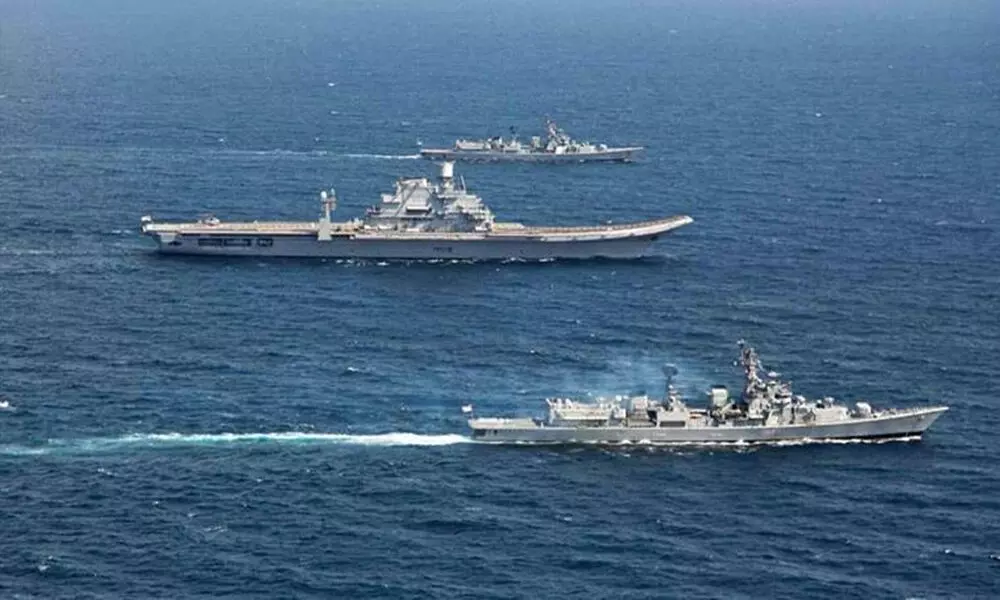Why India is reluctant to join maritime pacts?
India's continued unwillingness to join broad, issue-based, multilateral security agreements, may need a review
image for illustrative purpose

During the Raisina Dialogue, Union External Affairs Minister S Jaishankar, in articulating his description of the 'India Way', said that "India is now more of a decider or a shaper rather than an abstainer." This is a welcome change in India's approach to the region and the world. If India hopes to contribute to shaping the future, it will need to look outwards. This implies shedding archaic baggage of past decades, along with the affliction of being myopically inward looking. Assuming greater roles and responsibilities regionally and globally should form a vital element of the approach alluded to by the Minister.
It is in this context that India's continued unwillingness to join broad, issue-based, multilateral security constructs may need a review. One of these important multilateral groupings is the Combined Maritime Forces or CMF that operate extensively in India's backyard. The CMF website articulates that the multinational maritime partnership "exists to uphold the International Rules-based Order". This is a concept that India's leadership too has been seized of in recent years. Moreover, it is not an alliance, but rather a 'partnership'. Why then the reluctance to join?
The CMF is an agglomeration of about 34 countries engaged in myriad security tasks in the Arabian Sea and Persian Gulf Areas that are of critical and of direct interest to India. It has representation from countries spanning the entire globe. East and Southeast Asian representation includes Japan, the Philippines, Malaysia, Thailand, South Korea, and Singapore. Europe finds representation through Belgium, Denmark, France, Germany, Greece, Italy, The Netherlands, Norway, Portugal, Spain, and Turkey. Interestingly, all these players are from beyond the region, but have still invested in such a partnership, driven by their individual and collective national interests. Of course, regional players like Saudi Arabia, Jordan, Qatar, Bahrain, Kuwait, Seychelles and UAE are also part of the construct. Then there is Pakistan, which has been part of the CMF for well over a decade and has commanded two of the three Task Forces under the CMF on multiple occasions. In fact, the Pakistan Navy is currently in Command of Combined Task Force 151. Everyone seems to be playing, except India.
If India is to be a 'shaper' and 'decider' on the global stage, it needs to first be more proactive and engaged at the regional stage. Structures such as the CMF have the potential to accrue multiple strategic and operational benefits. For instance, being a part of the construct, Pakistan has a ready platform to promote its own narrative, build professional expertise, gain access to valuable operational information (if not intelligence) and, in essence, punch above its weight. Notably, it is able to play the game with practically no opponent, for instance, to challenge its version of events.
From a geo-strategic perspective, the Indian Ocean is progressively becoming the primary arena for global competition and volatility. Threats like terrorism, drugs and gun-running, piracy, etc., all compete for attention. Then there is inherent land-based volatility in the region spilling into the seas like in Somalia, Yemen, and more recently in the Persian Gulf. On top of all these, great-power competition in its latest avatar is also being played out in India's backyard. As USA and China jostle for influence, other players are either hopping on to one bandwagon or hedging their bets. A complex mosaic indeed, and a game requiring keen skill, and more importantly a fresh approach. It is increasingly apparent that 'more of the same' will not do, nor will rigid approaches to dynamic issues foment advantages.
From an operational perspective, the Indian Navy's INS Suvarna undertook an operation off the coast of Kerala recently, seizing over 300 kg of narcotics. A few days earlier, a French Naval Ship FS Guepratte had also carried out a similar operation in the Arabian Sea to seize over 600 kg of narcotics. Two players, one evident goal, but both playing separately. Could they not play in collaboration? Can the whole not be more than the sum of its parts? Will joining an issue-based, non-binding construct such as the CMF not accrue tangible operational benefits for India? As India's defence budget continues to be under stress, harnessing partnerships across the region could be beneficial.
From a regional and policy perspective, Prime Minister Modi has provided a vision of Security and Growth for All in the Region -- SAGAR. This alludes to cooperation and is collaborative in its essence. As players of all hues engage in pursuit of common goals in the region, India remains somewhat of an outlier. If India is to truly don the mantle of being a 'Preferred Security Partner', as envisaged by the political leadership, it may be time to think and act differently. It may be time to identify convergences with constructs like the CMF and, indeed, fast-track policy changes that promote India's interests through every possible avenue, including participation in multilateral constructs such as the CMF towards shaping and deciding the direction of the game.
(Binay Kumar Singh is an author and columnist. He can be reached at Twitter: @BinayBharat. The views expressed are personal)

